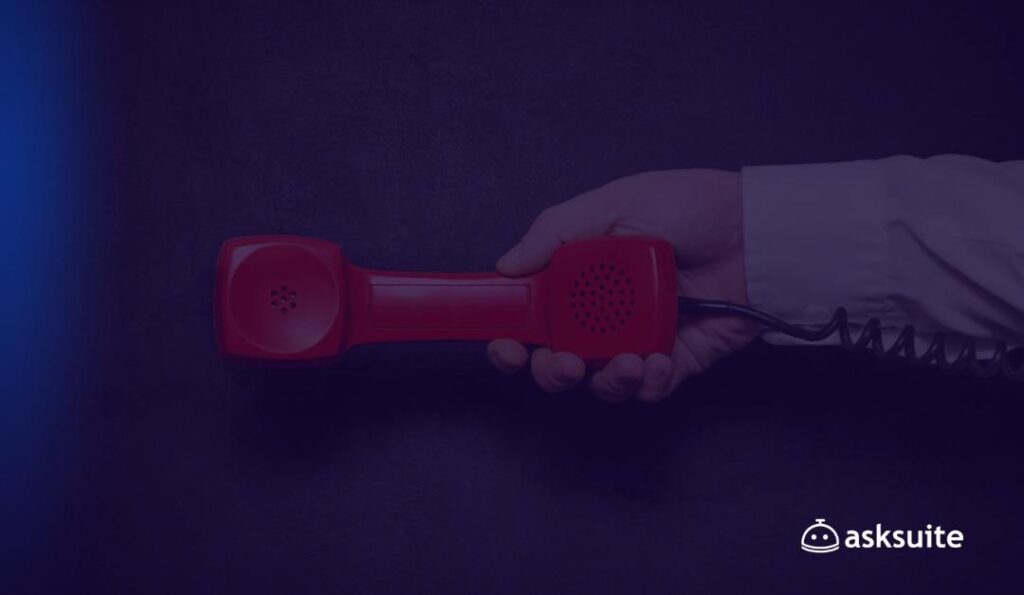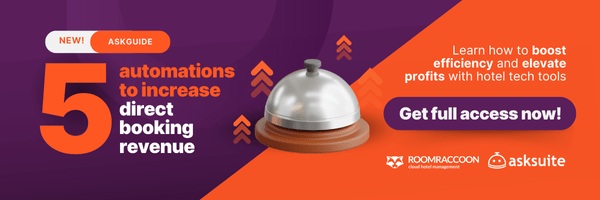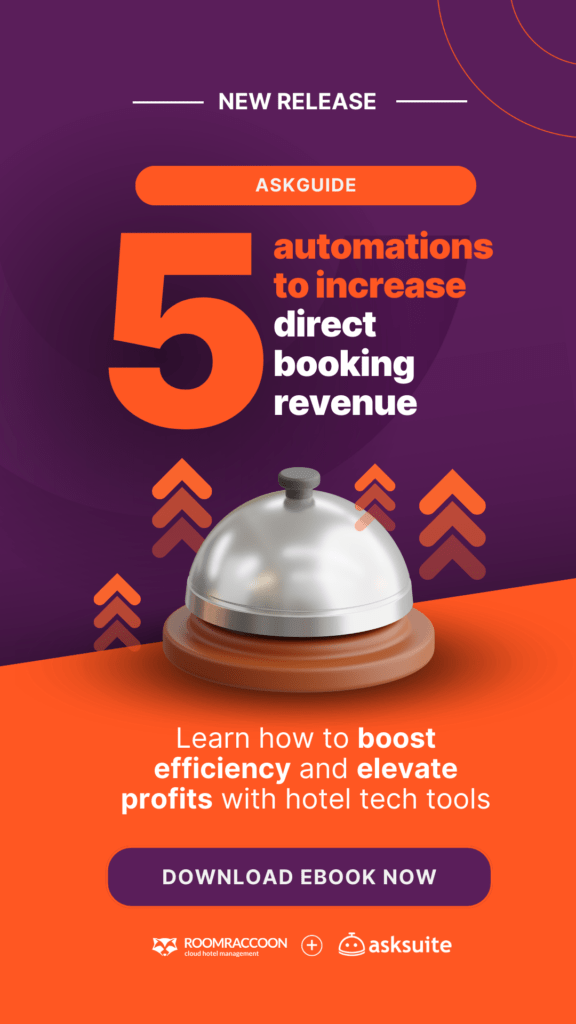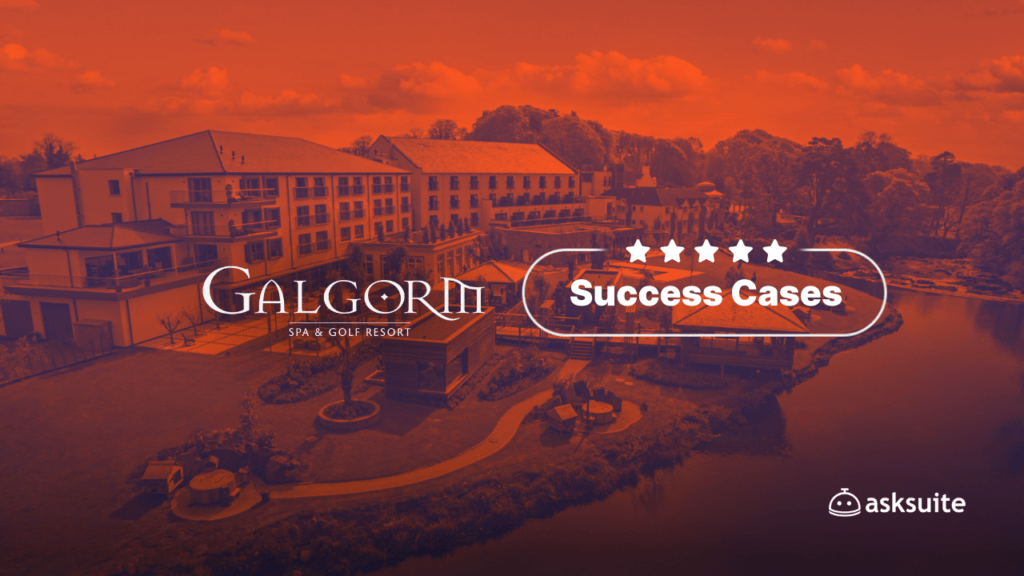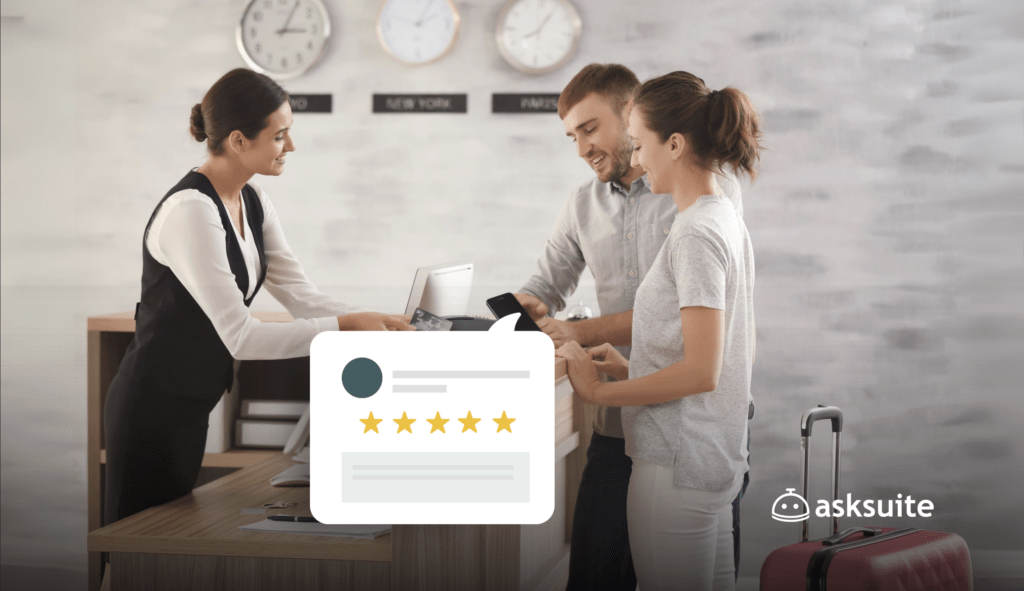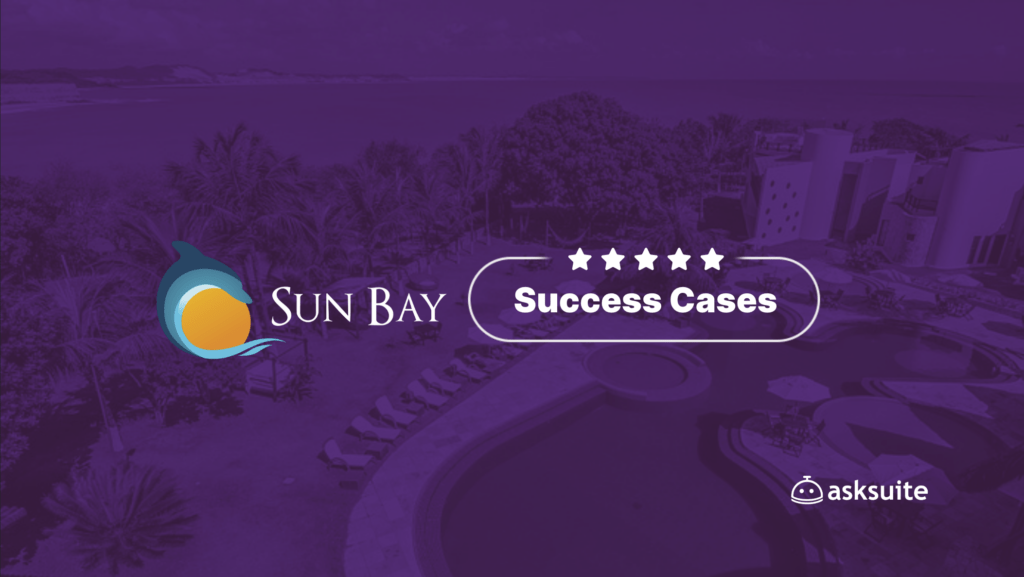Does your hotel reach out to potential guests who contacted you but didn’t book a room? Have you ever wondered why they didn’t follow through with the reservation and how it can impact your revenue?
A follow-up strategy can be responsible for up to 75% of a hotel’s success. This is what Susan Barry, Hotel Commercial Strategy Consultant, states in a podcast interview.
Follow-ups are a well-known strategy in sales. However, as it is a concept frequently used with B2B (Business to Business) negotiations, many hoteliers simply do not invest in it.
In fact, in a survey that Asksuite conducted with over 120 hotels, over 40% of the respondents said that they don’t use any follow-up strategy.
This can be a huge mistake. After all, when we talk about reservations, we’re talking about complex sales, where the purchase isn’t always made in the first contact between customer and company.
There are several factors that make booking a hotel a complex decision, such as :
- Depending on other people to help make the decision
- Checking the budget to see what is within their reach
- Evaluating options based on the property and amenities
That’s why consumers visit up to 38 websites before saying yes to a hotel, says Expedia. They want to check out their options, compare and talk to others before making a decision.
This gives hotels a chance to influence travelers during the decision-making process through follow-ups. An efficient follow-up strategy should take into account the lead time so you can prepare the right actions at the right time.
However, it can be difficult to track where your lead is in the decision-making process: Is your hotel the first one he’s contacting? Is the traveler ready to make a booking or are they just starting to plan?
Regardless of where in the cycle the traveler is, a well-done follow-up strategy can convince the lead to proceed with the reservation and increase not only bookings in general but DIRECT bookings. It’s a double-win!
In this article, we’ll look at:
- Sales follow-up
- The main reasons travelers abandon reservations
- A step-by-step guide to applying the follow-up strategy in different channels
Do you want to learn how to increase direct bookings with less effort using intelligent automation? Get full access to Asksuite’s exclusive guide and learn how to achieve it! Download it for free now:
What are Follow-Ups?
In the sales context (in our case, we are talking about reservations), follow-up means taking action after a contact or proposal presentation to make the lead advance in the booking process.
Contrary to what many people think, follow-up isn’t a synonym for being insistent and boring. Businesses — in our case, hotels — must get rid of that image of being “pushy” with bookings.
It’s also critical that hotels develop new ways of approaching potential guests. Using the old strategy of “just checking if they’ve been able to take a look at the proposal” is not the road to take anymore.
There are more effective ways to keep in touch with potential guests and persuade them to book with you.
This strategy aims to:
- Shorten the booking cycle
- Reduce the Customer Acquisition Cost (CAC), optimizing the business’ results
- Increase the reservation agent’s sales conversion rate
Sources of Follow-up in Hospitality
Here are some sources of follow-up in hospitality:
- Phone calls: When travelers ask you for a quotation during a call, you need to have a process in place to ask and register potential guests’ emails and the info required to send the proposal and the follow-up.
- Unanswered calls: Getting back to travelers fast increases the chances of converting sales, so make sure you can track these calls.
- Emails: If your hotel receives a quotation request via email, it’s recommended to send the proposal and the follow-up through this channel as well.
- Quotes via messaging channels
- Quotes via social media
- Cart abandonment in the booking engine
- Website Chatbot Lead Capture
- Landing Pages with Special Offers
In this episode of the Hotel Cast Podcast, we chat with Jutta Moore about the role of commissions in Hotel Sales. Jutta shares the best practices in Sales that help your hotel sell more. Listen here:
One thing to have in mind is that, as hotels have been embracing new technologies, follow-up becomes even more important. These days, most of the booking process (if not all of it) is performed by the potential guests themselves, with no help from any salesperson or hotel employee.
It’s important to note that hotels should take the initiative by contacting and following up with potential guests throughout the entire booking process. This truly increases the chances of successfully converting more bookings.
Types of quotations worth following up on
Many hotels already use some kind of follow-up strategies for these types of requests:
- Group Quotation
- Event Quotation
- Individual Quotes
When you have a small team, it might be difficult to follow up on every request. Here is when you need to be strategic. The bigger the request is (more potential revenue), the more effort you’ll invest in following up with them. One tip is to use automated follow-ups with regular requests and customize follow-ups to more attractive proposals.
Expert Tip
A follow-up isn’t always related to an abandoned cart or an indecisive traveler looking around. It can also be the perfect opportunity to upsell your products, according to your future guests’ profiles.
You can analyze the information you have on them, and see what other products you have that may spark an interest. You may even offer a discount on the service, to make sure the customer has a taste of your quality.
Why Are Guests Abandoning Reservations?
A follow-up can also be applied when the guest or future guest has given up on making the reservation and abandoned the online booking process. When this happens, a salesperson should try to contact that lead to find out what happened.
These days it’s easier for customers to walk away from the process at any time before completing the booking. In other words, to “abandon the hotel cart”.
There are many reasons why a person would abandon a cart that has nothing to do with your website or your strategy.
But let’s start by focusing on online reservations and what you can control—your website navigation. There are some things that leads can find annoying and will push them out of your website.
If the booking process is too complicated, your potential guests will end up searching for easier and safer ways of doing it elsewhere.
Here are some interesting stats:
- 9% of clients leave carts when they find the check-out confusing or too difficult.
- Around 15% of customers have concerns about paying online and for that reason, they also abandon the cart.
- 22% of customers find it irritating having to create a new account for booking a room or buying an upsell.
These numbers were taken from the research conducted by Barilliance. They represent the most common reasons why online visitors don’t complete online transactions. The good news is that these problems can be easily fixed.
The first tip is to put yourself in the customer’s shoes. This means you should test the buyer cycle on your website. That way, you’ll be able to check if the booking process is running smoothly.
The second tip is about online payment. As travelers are insecure about putting their sensitive data on different websites, you should let your future guest know what you are doing to secure the payment process.
For instance, is your payment page opening up on another tab? If so, you can fix this by making a redirect from the previous page to build up your guest’s trust in your website, and your payment system.
Having to create a new account can be annoying for some people. If you think that this is a hurdle, you can ask your hotel’s development team to add the “sign in with Google’’ option.
These are a few quick fixes that can be applied now that will have a great impact on your online bookings. No more empty carts for small reasons.
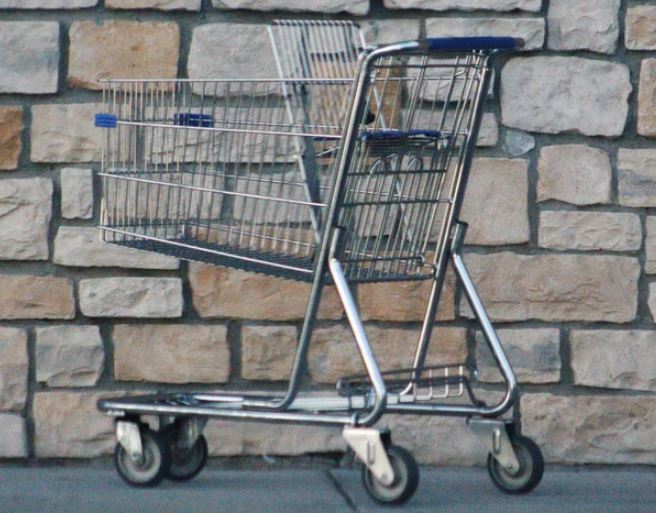
Recommended: Go beyond providing information and turn hotel customer service into sales. Here are the top 7 hotel sales best practices to increase revenue (online and offline): [Read more]
How Your Reservation Team Can Improve Your Hotel Revenue With a Follow-Up Strategy

Ok, so we’ve established follow-up is an important sales strategy. But many hotels and professionals don’t know how to do it. There are several techniques for persuading the potential guest and making advances towards a follow-up hotel booking.
However, it’s not a “one size fits all” recipe. Which technique is best depends on the characteristics of the business and the type of lead.
It’s worth testing them and seeing what works best in each case. But it only makes sense if there’s planning and repetition. If you use the follow-up strategy once in a while, you won’t be able to accurately identify the most effective ones for your hotel.
Regardless if you’re applying the follow-up strategy manually or automatically, the important thing is to set the criteria and the process of follow-up.
Here is a 5 step-by-step guide to help you apply this sales strategy.
1. Choose The Appropriate Channels
Good follow-up practices include different channels:
- Live Chat or chatbot
- Calls
- Texting
- Video calls
- Social media
- Face-to-face interactions.
According to our own research, 32.2% of hotels prefer to do follow-ups via emails, whilst 21.5% prefer callbacks.
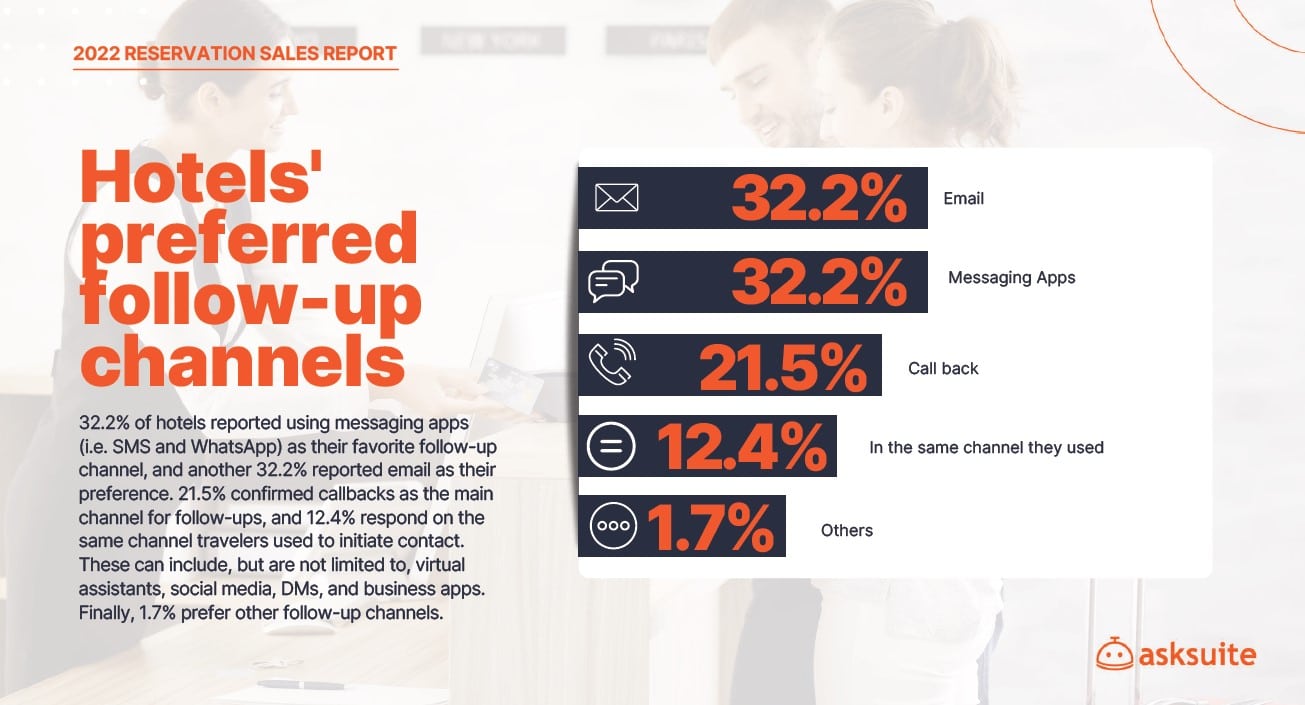
The goal is to increase the chances of getting the potential guests’ attention and converting sales. When planning follow-ups, think about the best channel to get the message across and set the timing you think it’s best.
Always take the habits of your ideal guest into account.
Often, the best channel to do a follow-up is the same one that your client has contacted you on. And since customers have different preferred communications channels, diversifying your contact channels is highly recommended.
The most important thing is to understand how to best communicate with each lead.
Plan your strategy carefully, prioritizing the leads’ preferences.
1.1. Calls
This channel provides more direct and closer contact with the lead. Precisely for that reason, you need to follow some practical techniques. Pay close attention to each one of them so that your communication is the best possible.
For instance, if the potential guest tells you to call next week, you should schedule it at exactly the date and time the guest asked you for. This will increase the trust between you and will avoid you being perceived as inconvenient for contacting them at inappropriate times.
Another pro-tip when it comes to approaching leads by phone: listen more than talk, and never leave a question unanswered. Many salespeople are so eager to talk about the promotions and the wonders of staying at the hotel that they forget to give customers time to talk.
When you let them talk, you’ll find more information to help you close the deal. Customers feel appreciated if they notice that you listened. Also, if you let them aks their questions and properly answer them, the odds of making a reservation grow.
In this article by Doug Kennedy, he lists 5 crucial questions your reservation team should be asking. By asking the right questions, hotels can start conversations that enable uniquely human engagements. Read Doug’s best tip here: [Top 5 QUESTions Your Reservations Team Should Be Asking In 2022]
1. 2. Emails
Emails can also be used for follow-up in hotel booking. In fact, one of our clients has reported that the email conversion rate at his hotel is between 25 and 35%.
Some features make this channel more efficient to formalize commercial proposals.
In this sense, an email marketing tool that allows you to send business proposals by email can be of great help. If you can combine an automation email tool and a chatbot, even better!
But don’t get too carried away when composing your emails. According to Boomerang, response rates declined slowly from 50% for 125-word messages to about 44% for 500-word messages.
The sweet spot for email length is between 50-125 words, all of which yielded response rates above 50%.
The size of the content is not the only point that deserves attention. The subject, appearance and body of the email are also important.
When communicating through this channel, consider all these points. Knowing how to write good emails is essential for a successful follow-up.
1. 3. Hotel Forms
Hotel forms are essential tools to collect information from travelers. Whether they are online or offline, those forms are a great way to learn more about your leads and personalize their experience.
Whether you’re performing research online or offline, remember you always have to ask for their permission before collecting their data.
And pay attention not to create forms that are too long. Otherwise, customers won’t have the patience to answer them completely.
1. 4. Social Media
Social media showcases products and services that hotels offer. Currently, the best known and most used for sales are Facebook and Instagram. However, TikTok has become a social platform that hotels follow closely since it is growing very fast.
If you use these platforms for online booking, they’ll also serve as a means of doing a follow-up. It’s even possible to contact your potential guests and close reservations via Instagram DMs or Facebook Messenger.
During the conversation, you can send suggestions for rooms/services or a social media post with hotel news. These actions are part of the booking follow-up strategy on social media.
Did you know that Asksuite’s chatbot is integrated with Instagram? Providing 24/7 customer service on this channel can boost your direct bookings. Watch this short video to learn how:
1. 5. Messaging Apps
WhatsApp is a widely used means of communication nowadays. Contrary to what you might think, this channel is no longer considered exclusively for personal matters. In many countries, most customers accept it as a channel for doing business.
As you may know, however, messaging is a completely different way of communicating. When establishing contact with your potential customer through WhatsApp, make sure you are doing it in the best way possible while respecting your potential guest’s privacy.
In this free complete guide, you will learn about Whatsapp Business for hotels and how to provide service for greater direct booking conversions:

1. 6. Automation Platforms
Automation and communication tools, whether for email or messaging, let you keep track of customers’ interactions and analyze their behavior. For instance, CRMs like Hubspot can automate follow-ups through emails.
They are a way to achieve effective results in attracting and managing potential guests regularly, in addition to facilitating the relationship with prospects through messaging platforms that are already part of the day-to-day activities of these contacts.
Chatbots are automated communication software that can work with messaging applications such as Instagram, Google Message, WhatsApp, and Facebook Messenger, and allow you to automatically communicate with travelers.
Today it’s already possible to integrate your booking engine to Asksuite to send automated follow-ups to visitors who abandon an online booking, for example. Or even schedule follow-ups within the platform, so your agents don’t forget to send it later. This way, it becomes a part of your sales process.
You can either do it by sending messages to prospects — created and programmed by your team similarly to what happens with email marketing — or by simply replying to their contact.
But if you don’t have software to help you, templates can go a long way.
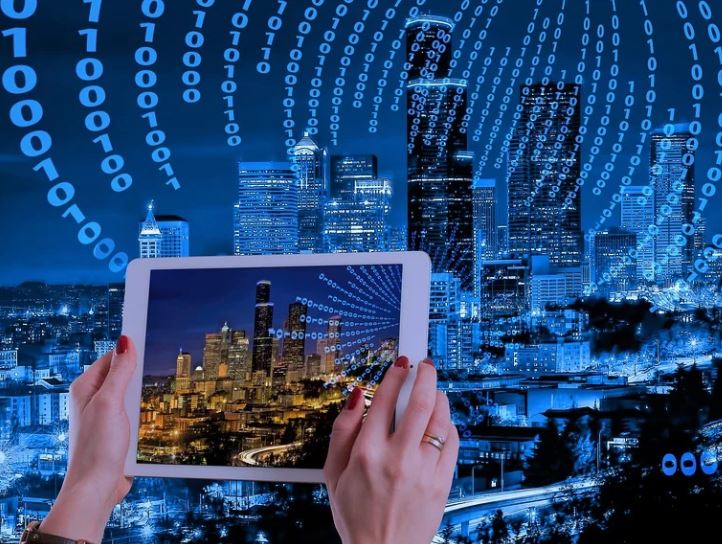
2. Choose When
It’s common to associate the follow-up with the contact only after sending the reservation proposal, but it can also occur at other times in the booking process. The first step in planning follow-up is to identify when to make contact.
Here are your options:
- Right after the contact: Send an email/message with content related to the leads’ information you gathered after they reached out to you. Make yourself available to answer any questions and invite them to talk or advance on the booking process.
- Right after a proposal: Send an email/message with a summary of what was covered during prior conversations and invite them to the next steps.
- “X” days after the proposal: Send an email/message containing engaging content from your website/blog/social media. Add some personal touches and take the opportunity to talk about the proposal.
These are just a few options on when to send a sales follow-up. Choosing which tactic is best depends on the conversation and agreement with the potential guests and their preferences.
Mapping the best time to approach them, and the content/objective of the follow-up increase your chances of succeeding. Turn the follow-up strategy into a process that should be followed by every team member.
Some reservation and sales teams prefer to use CRMs to manage sales pipelines and follow-ups. Others use platforms, like Asksuite, that combine everything in one single place, from omnichannel customer service to pipeline management per channel.
Expert tip
Follow-ups can be used not only with travelers that you’ve talked to but also with the ones that tried to book with you or contact you with no success. Especially during peak season, it can be hard to answer everybody.
One of our clients has reported that his hotel can experience up to 40% of missed calls in a given day, due to high demand and short staff.
As we mentioned before, we conducted a survey with over 120 hotels, and surprisingly, the majority of them said that they don’t know how much time it takes for a customer to wait before they give up on contacting a hotel. This is an important metric that hotel managers should be aware of.
With that said, from the chats that we have with our clients, we found two other situations where follow-ups are effective:
- Right after a traveler abandons a cart: Many online visitors will check out your price on your website and leave the reservation unfinished. Or will start a conversation via social media or Whatsapp, and disappear. With the help of technology, you can collect basic contact information and reach out to them to understand what happened and if there are any questions you could clarify.
- The day after an unsuccessful contact attempt: Unfortunately, not all requests are answered the same day, especially if you have a small team. Make it a routine to start the day by contacting those you missed the day before.
In both situations, you can see that there is a clear intention of learning more about your hotel, so don’t waste these booking opportunities!
3. Key Factors
Timing is an important factor in this strategy, but not the only one. There are several points to consider for an effective follow-up strategy:
- Frequency: The number of contacts and the interval between them vary according to the booking cycle and negotiation needs. It’s best to use common sense and set a limit, so you don’t become pushy and inconvenient.
- Opportunity: Try to associate your follow-up contact to an event – meetings, market news, company news. This will make your message more interesting and get your prospect’s attention. For instance, there is a lot of news from the tourism industry now, especially about border restrictions. Why don’t you get in touch with your leads and give them valuable travel information, while asking how you could help them with their next trip?
- Effort: Follow-up cannot represent the greatest effort in your booking process. Especially after the proposal, it should last a maximum of one-third of the booking cycle time.
4. Deliver Valuable Content and Smart Triggers
Follow-ups are an opportunity to position yourself as a ‘problem-solver” for potential guests.
To make the best use of this moment, offer quality content, related to the leads’ pain points and context, and be open to listening and answering any doubts they may have.
Take the opportunity to dig deeper into their problems and explore the implications of not choosing you to be their partner in this experience.
The best agents can easily identify key information during service, such as the reason for the trip, how many people are planning to travel, and more. Sending a personalized follow-up tackling these questions will add value that will surely be appreciated by the potential guests.
Examples:
- A family with children will love to learn about the activities in the hotel for their little ones.
- A couple will appreciate it if you send them a voucher for a special first dinner at the hotel.
- An invite for a photoshoot session on Instagram can also increase excitement and engagement for some travelers.
The strategy here is to give personalized information for their special time at your hotel. Go beyond the old and boring: Did you get our email with the room quotation?
Success stories, for instance, are an excellent way to speed up bookings. If the potential guests are in doubt after receiving the proposal, show them information and stories of how other customers had a great time at your property.
You can show how other guests had fun at your place and the surrounding areas. If they are considering your property for an event, show them how previous events have succeeded at your place.
This kind of mental trigger can influence decision-making. The more familiar your examples are with the traveler’s context, the better.
Mental triggers are very important in sales that your team should know. They can impact travelers and speed up the buying cycle. A common one that many hotels use is asking the traveler during a room quotation:
“ We have many booking requests right now, but I pre-booked this room for you. I can hold it until 5 pm for you so you have time to book it. Would that work for you?”
More often than you think, people will do their best to book it since they don’t want to miss the opportunity!
5. Stablish Next Steps With Clear Call-to-Actions (CTA)
Whenever you do a follow-up, define what the next step is. After all, the purpose of follow-up is to move forward in the negotiation, and having the next step clear is the best way to ensure that it will happen.
For instance, if the travelers say they need to analyze the proposal with their group or family, ask how much time is needed and agree on an appropriate date or time for you to return.
Always set deadlines. That way, you strengthen the relationship, stimulate the lead’s commitment, and gain trust. Also, don’t forget to send the link and the instructions to the travelers so they can easily finish their bookings.
Extra tip: When writing to the lead with the next steps, try to write using imperative, like; “Book”, “Write”, “Request”. We’ve tested here at Asksuite and we saw that this type of communication raised up to 50% the effectiveness of the CTA.
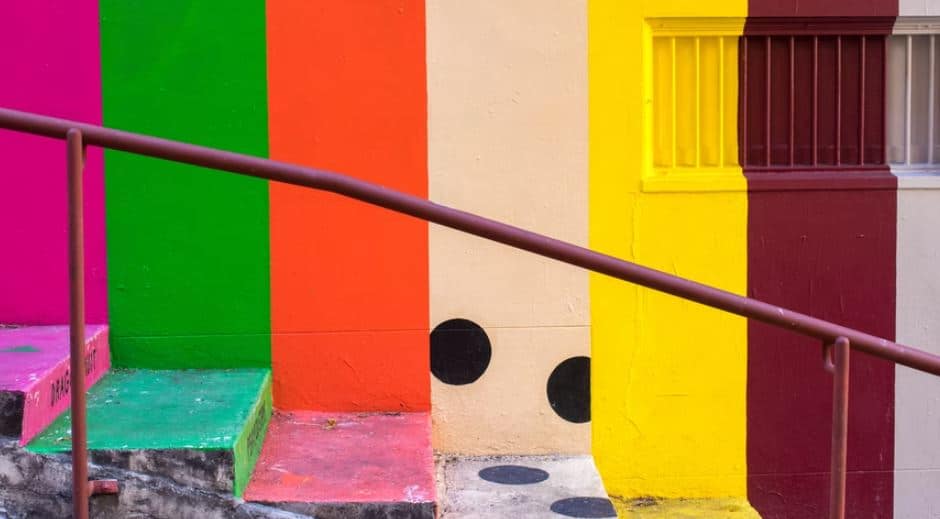
In this article, we explain 6 crucial steps in maintaining hotel customer retention: [Read here]
A Unified Service Impact Hotel Conversions
In the hotel industry, an omnichannel approach is a strategy that seeks to provide guests with a seamless experience, whether they are booking or contacting a hotel through an online platform (using a desktop or mobile device), over the phone, offline, or through any other channel used by the company.
The most important point is the integration between the multiple channels. This creates a sense of continuity for the consumer as they can use multiple channels to contact a company.
In other words, omnichannel is a strategy that offers the potential guest an integrated experience.
This integration must exist between the distribution, promotion, communication, and follow-up channels.
The Experience Impact report, released by Merkle in 2019, states that 66% of consumers indicated that they care more about the experience than the price of the product or service.
That’s why the number of companies investing in the omnichannel experience jumped from 20% in 2012 surveys to more than 80% in 2020, according to PWC 2020 retail report.
This data makes clear the urgency for brands to implement an omnichannel strategy to take advantage of its limitless opportunities.
Take a look at how the Asksuite omnichannel platform works:
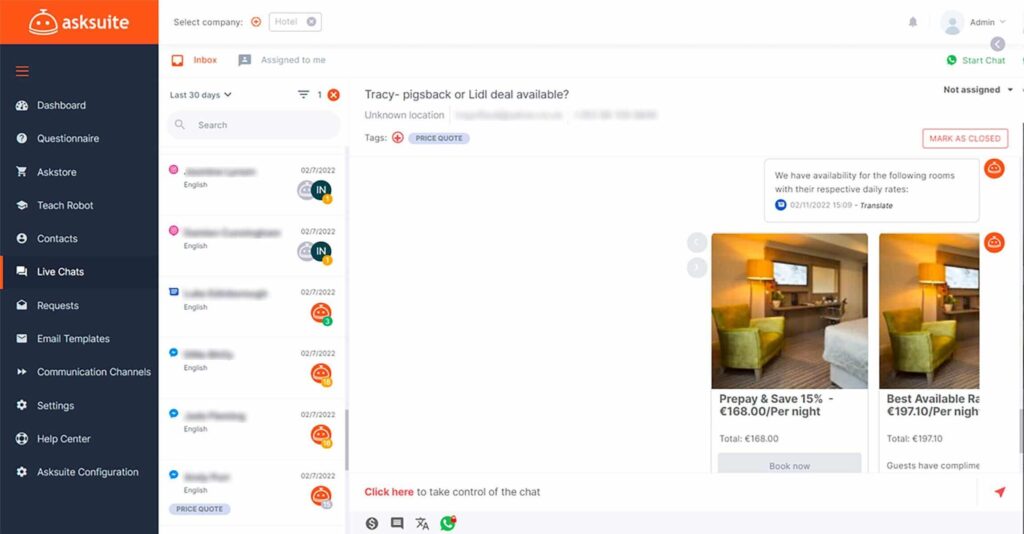
All conversations are unified in one chat, even if they come from different channels. In the picture above, you can see the tag “IN” and another one with the Asksuite logo. That means that the same person has contacted the hotel via Instagram and Website Chat.
Knowing their preferred channel, you can send a follow-up through that channel. And if the traveler asks you to change channels, you won’t be lost! You can check the conversation and send the proposal by WhatsApp, for example. Easy!
If you want to learn more about our solution, click on the button below and book a demo:
Sales Follow-Up: Why Should You Invest in This Sale Strategy?
There are a lot of ways to execute a follow-up, but as you read in this article, it all begins with data gathering and a careful analysis of what your guest wants.
Listen to their needs, discover their favorite channels, and explore the possibilities in each one of them.
Don’t limit yourself to a simple call, and don’t give up on the first try. Persuasion is everything in sales, and in the hotel industry, it’s s no different. It’s a matter of balance: Don’t give up too easily, but don’t be pushy.
We hope this article helps you structure or review your follow-up strategy.
If you’re interested in boosting your hotel sales even more through digital marketing, check out our free eBook on how online channels can help you win direct bookings:
